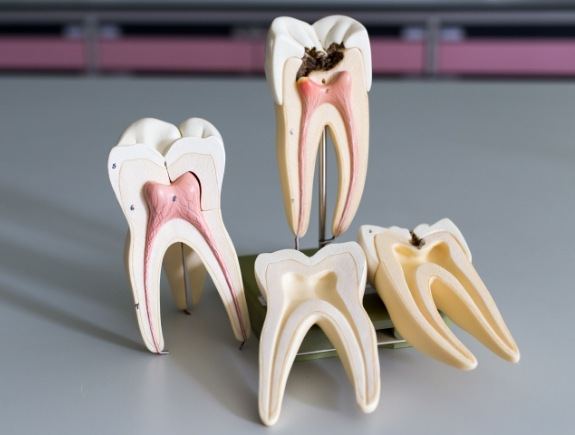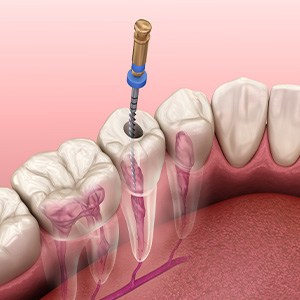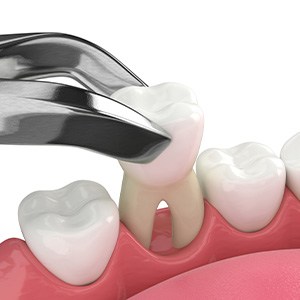Root Canal Treatment – West Caldwell, NJ
Saving & Protecting Your Infected Teeth
At least at first, it’s easy to think root canals are very unpleasant procedures. Pop culture and gossip can make you think they hurt a lot and worsen life. However, the truth is that root canal treatment in West Caldwell can relieve your tooth’s pain. We at Magid Dental Care only offer it so your smile will thrive! If you’d like to learn more, just keep reading or attend a consultation at our office.
Why Choose Magid Dental Care for Root Canal Treatment?
- Same-Day Dental Emergency Appointments
- Experienced Ivy-League Trained Dentist
- Relaxing Dental Sedation Options Offered
Do I Need Root Canal Treatment?

A root canal treats your tooth’s infection, which is caused by harmful bacteria reaching the pulp. So, you may need one if you show signs of infected teeth. The most common of these symptoms are:
- Tooth Sensitivity – A tooth may be infected if it aches from hot or cold temperatures.
- Discolored Tooth – In many cases, an infected tooth will darken over time.
- Extended Tooth Pain – Tooth pain is normal on occasion, but it can point to an infection when it persists.
- A Loose Tooth – Given enough time, pus from infected pulp can soften the bone beneath a tooth. This effect can make said tooth feel loose.
- Swollen Gums – A tooth infection causes pus to gather in the gums, making your gum tissue swollen and tender.
The Root Canal Process

A root canal can be rather complex, at least compared to other dental services. Dr. Magid and our team always follow a multi-step process when providing one.
Firstly, we start by numbing your mouth with local anesthesia. This measure keeps you from feeling pain during the dental work that follows. You’ll only sense some mild pressure as our team treats your infection.
Once your tooth is numbed, Dr. Magid will begin the actual treatment. He’ll first use dental instruments to reach your tooth’s innards and remove its pulp. From there, he’ll sanitize this interior and refill it with gutta-percha (i.e., a filling material). Dr. Magid will then conclude his care by sealing the tooth and fitting it with a temporary crown.
After your initial treatment, you’ll return for a follow-up visit in a few weeks. We’ll provide you with your permanent dental crown at that time. When fitted, this cap should protect your treated tooth and keep it safe!
The Benefits of Getting a Root Canal

Rather than make things worse, a root canal offers benefits like:
- Pain Relief – An infected tooth’s pain comes from its pulp, so a root canal will ease your aches by removing this material.
- No Tooth Loss – By removing your infected pulp, a root canal saves your tooth. That means it keeps you from needing a tooth extraction (or replacement) later.
- Smile Protection – Since it replaces the pulp and sets a dental crown, a root canal protects your tooth from further harm. It greatly reduces the risk of future decay or re-infection.
- Gorgeous Results – A root canal will hide your tooth’s prior damage, as its filling and dental crown are both tooth-colored.
Understanding the Cost of Root Canals

While you might expect the cost of a root canal treatment to be the same for every patient, there are actually a few variables that can influence the amount you pay. We can put together an estimate during your initial consultation, and we can help you explore ways to make the cost more manageable. Please let us know if you have any questions or concerns regarding the price tag of your root canal treatment.
Factors That Can Affect Root Canal Cost

First of all, you need to remember that not all teeth are the same. Compared to your front teeth, your molars have more canals to clean. Consequently, you can usually expect to pay more for a root canal treatment that involves the molars.
Additionally, some root canal treatments are more complex than others. We can often perform the procedure in-office, but in certain cases, we may have to refer you to a specialist, which can influence the overall cost.
Finally, you may need to pay for more than just the root canal treatment itself. Oftentimes, you will require a crown to protect the tooth that was treated. As such, you’ll have to make room in your budget for the cost of the crown.
Is it Cheaper to Pull My Tooth?

A tooth extraction often costs less than a root canal treatment. That said, having a tooth removed comes with a number of consequences. For one thing, when the tooth is gone, it will no longer provide stimulation to the jaw, which can easily lead to bone loss. On top of that, your remaining teeth may drift out of place and cause alignment problems. And while you can replace an extracted tooth, doing so means that you need to account for the cost of a dental bridge, partial denture, or dental implant.
Meanwhile, if you have a root canal treatment performed, you can keep your natural tooth, thus potentially saving yourself a lot of trouble in the long run. As such, root canal treatment is typically the better choice for your budget and your smile.
Does Dental Insurance Cover Root Canal Treatment?

Many dental insurance plans do indeed provide coverage for root canal treatment. Take the time to review your policy to see what benefits are available. Note that coverage can vary from plan to plan depending on whether your insurance company considers root canal treatment to be a major procedure or a minor one.
Other Options for Making Root Canal Treatment Affordable

We have an in-house savings plan that offers discounts on many different dental services. This can be a great way to save money on dental care even if you don’t currently have dental insurance. Additionally, if you would have trouble paying the full cost of your dental care all at once, you may want to think about applying for CareCredit financing. This option lets you pay for your treatment in monthly installments with little to no interest to worry about.
Root Canal Treatment FAQs
How Long Does It Take to Recover From a Root Canal?
Recovery time can vary from patient to patient. That said, it’s often possible to head back to work the day after the treatment; however, you may want to take a few extra days of rest if your job involves any sort of physical labor.
You’re likely to notice some soreness in your mouth after your root canal treatment. Fortunately, you can manage the discomfort with an over-the-counter pain medication such as ibuprofen. The pain should start to fade after three days; if it seems to be growing more severe instead, please get in touch with us right away.
How Long Does a Root Canal Take?
It typically only takes one appointment to complete a root canal treatment, and you can usually expect the duration of the visit to fall somewhere in the range of 30 to 90 minutes. Teeth near the back of the mouth usually take longer to treat since they have more canals that need to be cleaned.
In certain cases, a root canal treatment might be broken up into two separate appointments. The first visit will involve having an antibacterial medication applied to the tooth, and the second visit will consist of the inside of the tooth being cleaned.
What Happens If You Wait Too Long for a Root Canal?
You may think that you can simply wait for a tooth infection to go away on its own. Unfortunately, this is not a viable option; without proper treatment, the infection will continue to grow more severe, and it could even start to spread to other parts of your mouth. You might even end up needing to have the tooth removed altogether.
Sometimes the pain caused by a tooth infection might suddenly disappear. This is actually a sign that the problem is growing worse, as it typically means that the infection has completely killed the nerves of the tooth.
In short, delaying root canal treatment for too long can lead to serious consequences. You should therefore have the procedure performed as soon as you can in order to protect the health of your smile.
Are Root Canals Safe?
Root canal treatments are indeed considered safe. In fact, their success rate is around 95%. You may have heard that the procedure can increase the chances of suffering from certain medical conditions, but such claims are based on old, faulty research that was debunked a long time ago.
There is a small chance that some bacteria may remain inside the tooth after the treatment, which could potentially lead to a new infection. Rest assured that the chances of this happening are low. Nevertheless, it’s best to keep an eye out for swelling, pain, fever, and other possible warning signs of reinfection. If you notice any concerning symptoms, please let us know immediately so that we can help you figure out what to do next.
